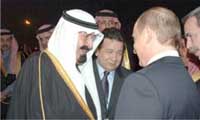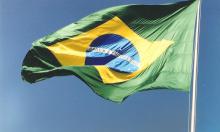Jordan's king, Russian president discuss Israeli-Palestinian peace, Iran's nuclear program
Jordan's King Abdullah II and Russian President Vladimir Putin on Tuesday urged that a diplomatic solution be found for Iran's nuclear standoff and called for a stronger international push for lasting Mideast peace.

After three hours of closed-door talks with the visiting Russian leader, the Jordanian monarch said he had underscored "the importance of resolving the core conflict" in the Middle East the Palestinian-Israeli conflict.
Abdullah highlighted the importance of Russia's role in the so-called Quartet of Mideast peace mediators, that also includes the United States, the European Union and the United Nations.
Putin, who arrived here late Monday, was also to meet later with visiting Palestinian leader Mahmoud Abbas, after a quick visit to the biblical baptismal site on River Jordan. He thanked Abdullah for a plot of land that Jordan has given Russia to build a Russian Orthodox Church there.
During his Mideast tour, which included stops in Saudi Arabia and Qatar, Putin had said he planned to host a Mideast peace conference.
Standing next to Abdullah on Tuesday, Putin told reporters that "support is growing" for a Russian proposal floated three years ago, for a wide-scale Middle East peace conference. The conference should include all Mideast tracks, namely the Syrian, Lebanese and Palestinian, Putin said, and also tackle ways to "conquer international terrorism."
King Abdullah, a key U.S. ally whose country has diplomatic relations with Israel under a peace treaty signed in 1994, said he and Putin "agreed that negotiations for the establishment of a viable Palestinian state should be accelerated."
The two reiterated "profound concern" about the Palestinian infighting and over Israel's dig near a Muslim holy shrine in Jerusalem. On Iraq, they expressed "mutual commitment to helping ensure Iraq's unity, stability and security," Abdullah said.
Abdullah said the two also discussed Iran's nuclear standoff with the West and "continue to believe that a diplomatic solution to this crisis must be found." They also share the goal of a Middle East free of Weapons of Mass Destruction, Abdullah said.
Like other key U.S. allies, Egypt and Saudi Arabia, Jordan has expressed concerns over the growing Shiite Muslim influence in the region, saying it is boosting the hard-line Tehran regime and giving rise to more extremism, while jeopardizing an Israeli-Palestinian settlement and threatening their own states.
Last month, Abdullah said he wants to develop Jordan's nuclear capabilities for peaceful purposes in a direct message to Iran that its own nuclear pursuits will not go unchecked and that Arab nations will not sit idly while Tehran is flexing its nuclear muscles in the region. Washington has indicated it had no objection to a peaceful Jordanian nuclear program.
But Putin has appeared frustrated with his former Cold War foe's policy. Leveling his harshest criticism yet of the United States, he said last week that Washington had "overstepped its national borders in every way" and is fostering "a new global arms race."
U.S. Secretary Robert Gates countered on Sunday that "one Cold War is enough," adding that he would go to Moscow to try to reduce any tensions.
There were speculations that Abdullah would ask Putin to assist Jordan in acquiring nuclear technology.
But Russia's Interfax news agency only said that several bilateral agreements were signed after the talks Tuesday, including a contract for the sale of Russian Kamov Ka-226 helicopters to Jordan.
In earlier stops in Saudi Arabia and Qatar, Putin forged oil diplomacy and pushed for a natural gas cartel, reports AP.
Putin and the Qatari Emir, Sheik Hamad bin Khalifa Al Thani, announced they would explore the creation of such a cartel, to represent the interests of producer countries in controlling the global market. Russia and Qatar are two of the world's largest producers of natural gas, and tiny Qatar sits atop the world's single largest gas field.
European Union leaders have said they would stand against any effort by Russia to create a gas cartel, fearing that energy prices and Russia's political clout could rise dramatically. Europe gets 44 percent of its natural gas imports from Russia.
Subscribe to Pravda.Ru Telegram channel, Facebook, RSS!




